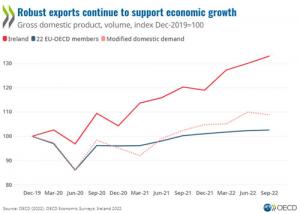Finance & Economics
Tajikistan to Address Food and Nutrition Insecurity with World Bank Support
The World Bank’s Board of Executive Directors, on December 22, approved additional grant financing of $50 million from the Crisis Response window for the Strengthening Resilience of the Agriculture Sector Project in Tajikistan to support efforts of the Government of Tajikistan to mitigate food and nutrition insecurity impacts on households and enhance the overall resilience of the agriculture sector.
- Read more
- 386 reads
How Ukraine is Managing a War Economy
Russia’s invasion has inflicted terrible human and economic suffering on Ukraine and the country faces a winter of air strikes and rocket attacks against critical infrastructure. Last week the IMF’s management approved Ukraine’s request for Program Monitoring with Board Involvement—the first arrangement of its kind—to maintain economic stability and catalyze donor financing.
- Read more
- 331 reads
World Bank Approves $311 Million to Increase Grid-Connected Renewable Energy Capacity in West Africa
Existing and prospective electricity customers in Chad, Liberia, Sierra Leone, and Togo will benefit from the new Regional Emergency Solar Power Intervention Project (RESPITE) approved today for a total amount of $311 million in International Development Association (IDA)* financing. The new project includes a $20 million grant to help faciliate future regional power trade and strengthen the institutional and technical capacities of the West Africa Power Pool (WAPP) to undertake its regional mandate.
- Read more
- 335 reads
New Financing to Support Cambodia’s Economic Recovery and Long-Term Resilience
Cambodia’s efforts to promote a resilient recovery from recent economic shocks were today bolstered by a $274 million credit from the World Bank for the Cambodia Growth and Resilience Development Policy Operation. The financing approved by the World Bank’s Board of Executive Directors will support reforms that will boost growth and strengthen Cambodia’s resilience.
- Read more
- 337 reads
IMF Board discusses Program Monitoring with Board involvement for Ukraine
The Executive Board of the International Monetary Fund discussed a Management-approved PMB for Ukraine on December 19. This 4-month PMB is designed to help Ukraine maintain stability and catalyze donor financing.
- Read more
- 314 reads
Finland: boosting innovation and productivity while ensuring sound public finances will be key to a stronger and sustainable economy, says OECD
Finland recovered rapidly from the COVID-19 shock but growth has stalled following Russia’s war of aggression against Ukraine. Soaring inflation has reduced household disposable income in Finland and its trading partners, slowing the economy, according to a new OECD report.
- Read more
- 300 reads
Spain needs to step up its foreign bribery enforcement without delay, says the OECD Working Group on Bribery
Since the OECD Anti-Bribery Convention entered into force over 20 years ago, Spain has successfully convicted only two individuals in one foreign bribery case, and has not convicted a single company. Spain continues to close cases prematurely. Prosecutors have insufficient time to conduct their investigations and face challenges in deploying adequate investigative measures. Spain needs to address these issues urgently and improve detection by regulating voluntary self-disclosure and protecting whistleblowers.
- Read more
- 325 reads
Why biodiversity is good for our health
The natural world has gifted humanity with untold health benefits, and it is believed that it harbours many more undiscovered health breakthroughs. However, we risk losing these benefits, if we continue to degrade the environment.
- Read more
- 334 reads
Ireland: Structural reforms are needed to ease long-term pressures on public finances

- Read more
- 330 reads
Finland: boosting innovation and productivity while ensuring sound public finances will be key to a stronger and sustainable economy, says OECD
Finland recovered rapidly from the COVID-19 shock but growth has stalled following Russia’s war of aggression against Ukraine. Soaring inflation has reduced household disposable income in Finland and its trading partners, slowing the economy, according to a new OECD report.
- Read more
- 327 reads
Human Rights
Fostering a More Humane World: The 28th Eurasian Economic Summi

Conscience, Hope, and Action: Keys to Global Peace and Sustainability

Ringing FOWPAL’s Peace Bell for the World:Nobel Peace Prize Laureates’ Visions and Actions

Protecting the World’s Cultural Diversity for a Sustainable Future

Puppet Show I International Friendship Day 2020

